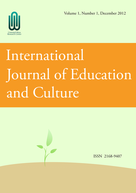


Volume 12 Issues 3-4 (2023-12-31)
Volume 12 Issues 1-2 (2023-06-30)
Volume 10 Issues 1&2 (2021-06-30)
Volume 9 Issues 3&4 (2020-12-31)
Volume 9 Issues 1&2 (2020-06-30)
Volume 8 Issues 3&4 (2019-12-31)
Volume 8 Issues 1&2 (2019-06-30)
Volume 7 Issues 3&4 (2018-12-31)
Volume 7 Issues 1&2 (2018-06-30)
Volume 6 Issues 3&4 (2017-12-31)
Volume 6 Issues 1&2 (2017-06-30)
Volume 5 Issues 3&4 (2016-12-31)
Volume 5 Issues 1&2 (2016-06-30)
Volume 4 Issues 3&4 (2015-12-31)
This qualitative case study examined the teacher agency of three elementary school teachers in mainland China. Bronfenbrenner’s ecological system framework was used to guide this study. Data were collected through interviews, classroom observations, and journals together with field notes. Specifically, this study examined how these primary school teachers enact agency to help facilitate their professional development during the curricular reform. By situating teachers’ agency in their professional paths, this study conceptualized interaction and interplay of teacher agency with other factors in the ecosystem of the curricular reform.
Educational ranking should in fact be subsumed under social ranking since education is a social activity. Countries put a lot of premium on education as a way of developing their human capitals, with the assumption that developing education is developing the future of economic, political, and social well-being. Therefore, educational ranking deserves a special mention in itself. Educational ranking is conducted at two levels. First, there are several world university ranking systems which compare and then rank tertiary institutes for their academic excellence. Second, below the university level, there are ranking systems which compare and rank countries on their high school and elementary school students on selected subjects of the school curriculum. This paper reviews these educational ranking systems.
The use of technology has become a major phenomenon in the context of K-12 education around the world. This article addresses the use of technology in the elementary classrooms. It first explains the nature of technology use in the classrooms. It then examines the benefits of using technology in the classrooms. Further, it discusses the pitfalls of using technology in the classrooms. Finally, it proposes practical implications for elementary teachers to use technology effectively and wisely so that it facilitates students’ learning in the classrooms.